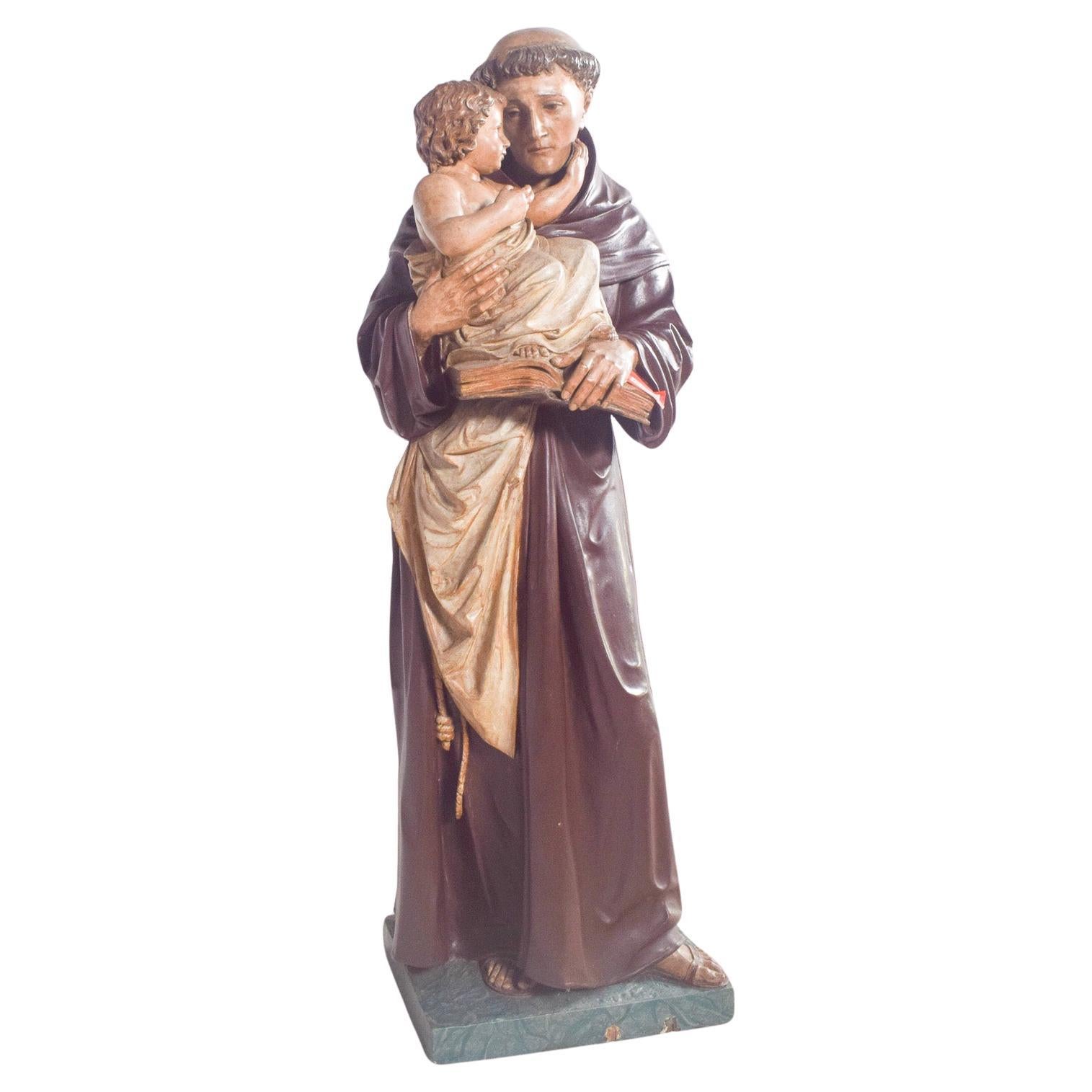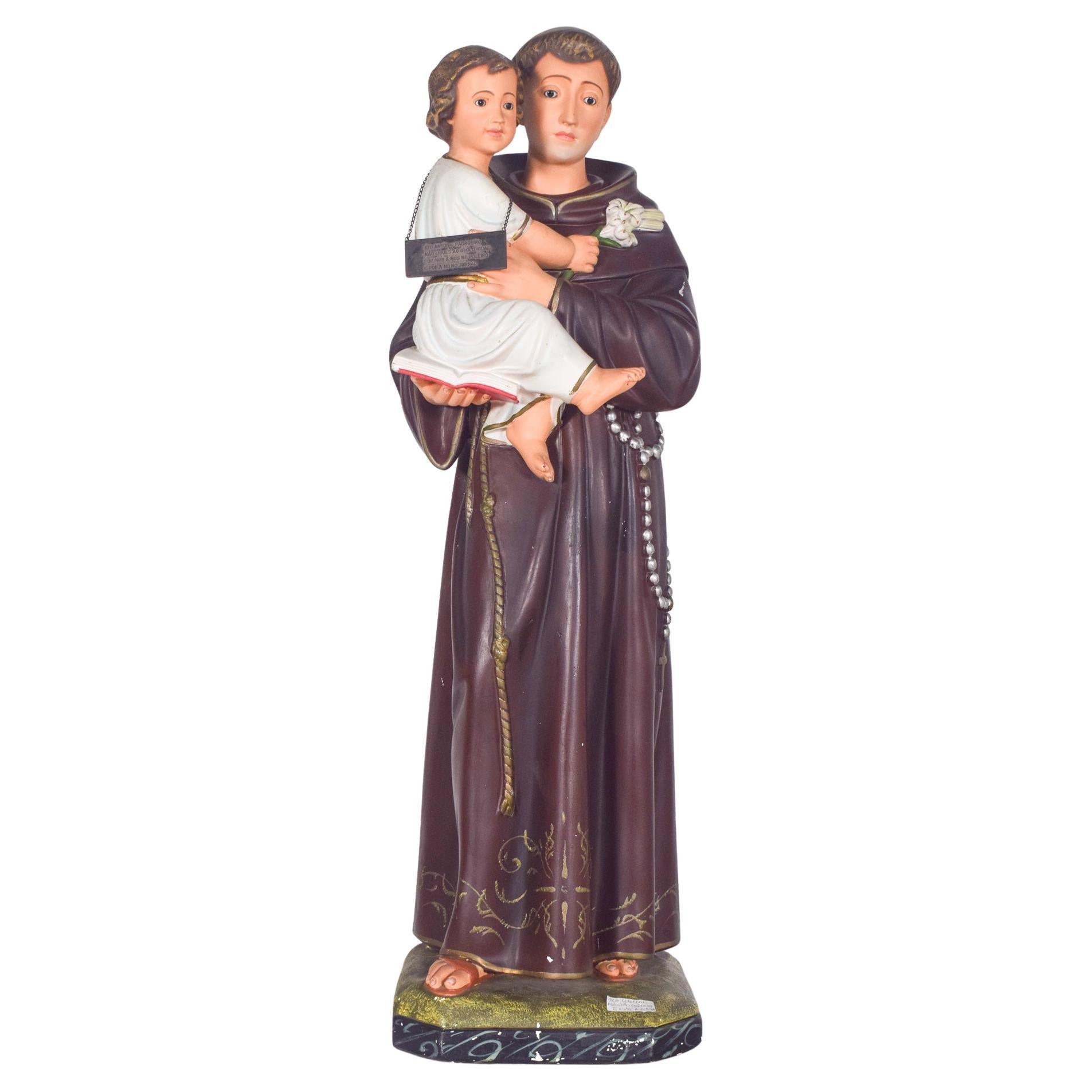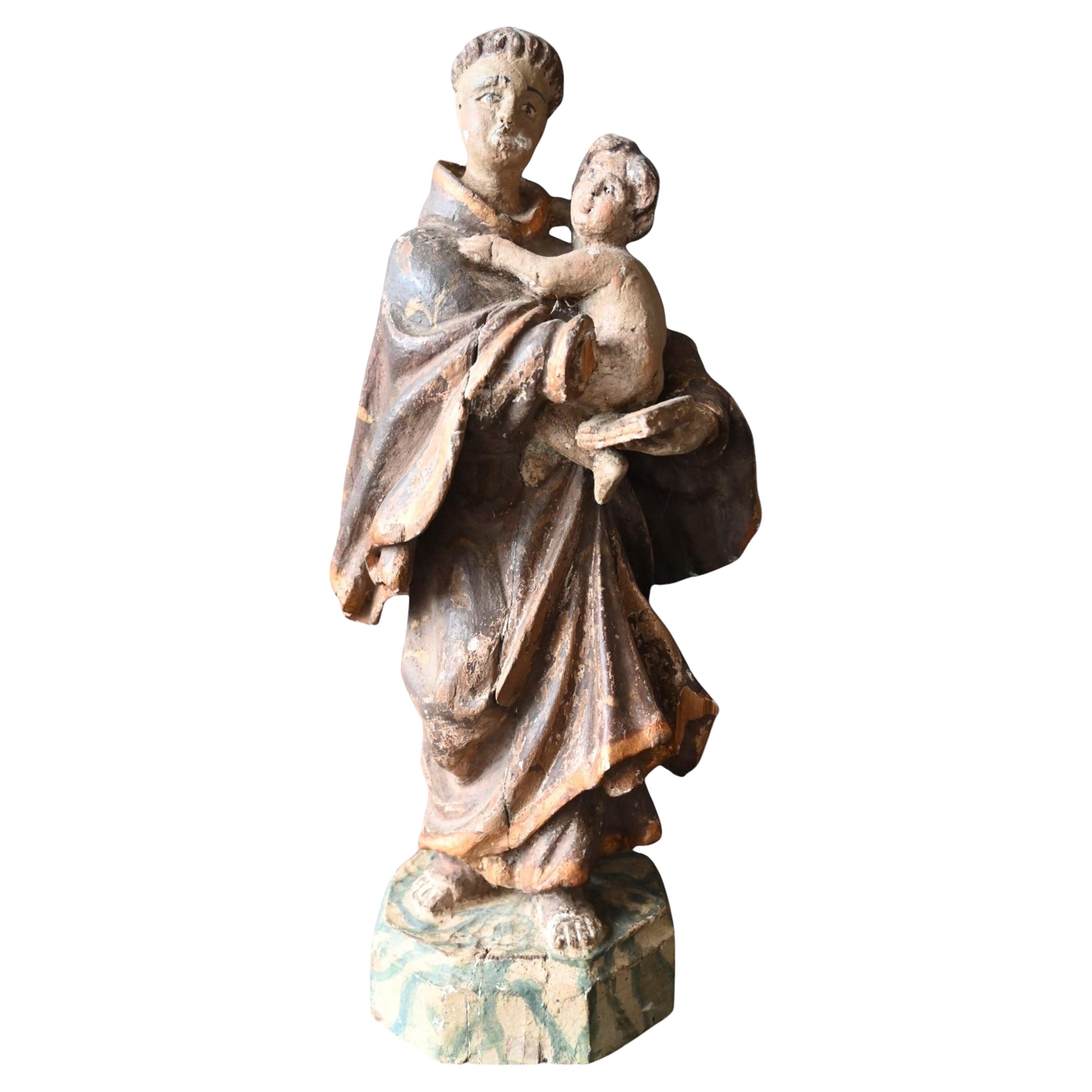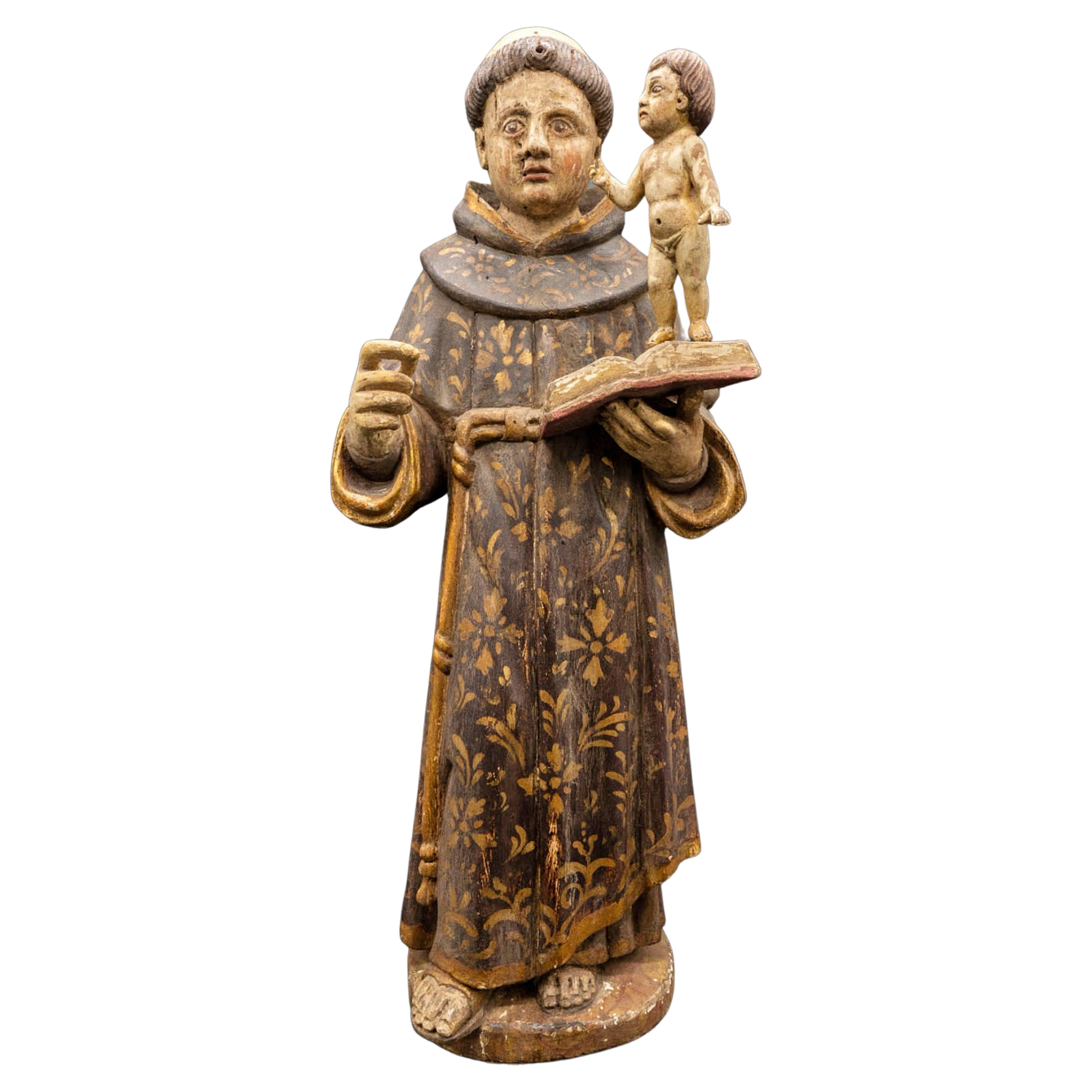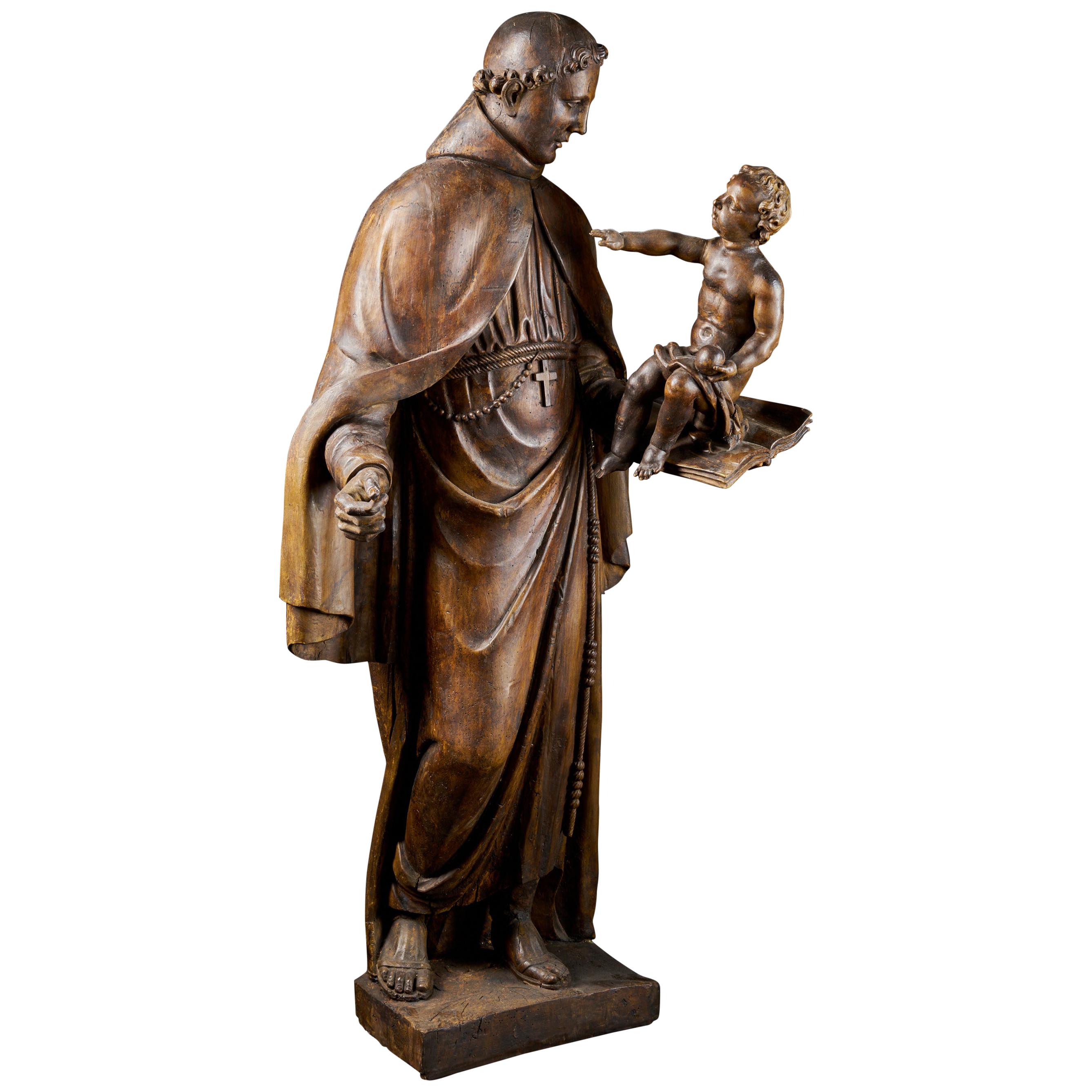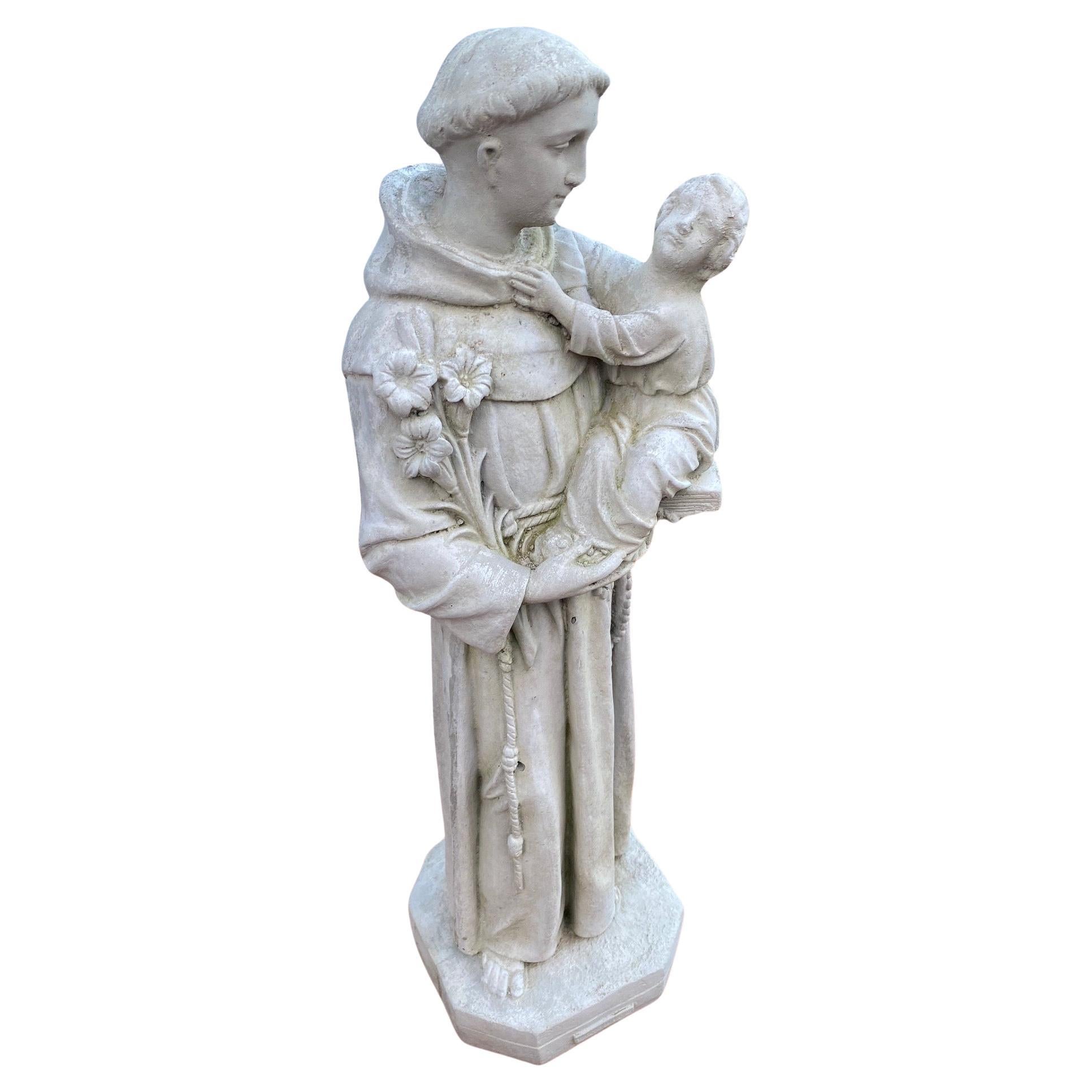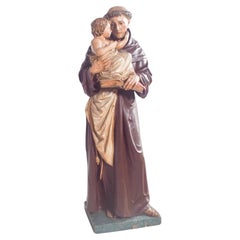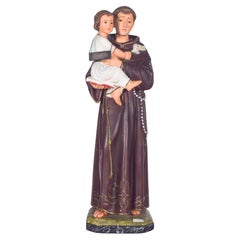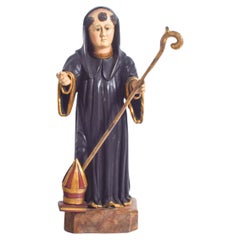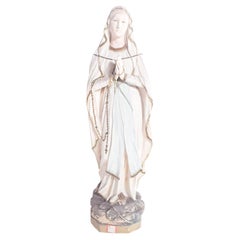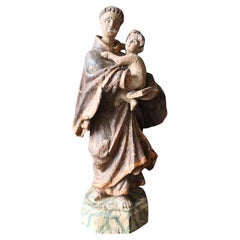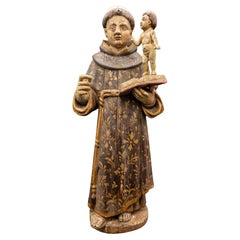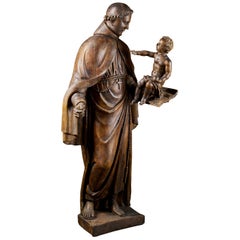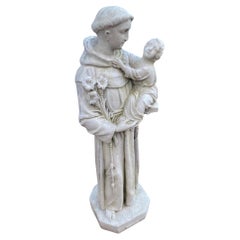Items Similar to Sculpture of Saint Anthony With the Child, in Ceramic
Video Loading
Want more images or videos?
Request additional images or videos from the seller
1 of 10
Sculpture of Saint Anthony With the Child, in Ceramic
$1,546.46
£1,145.66
€1,300
CA$2,127.07
A$2,365.91
CHF 1,241.15
MX$28,869.49
NOK 15,578.04
SEK 14,680.42
DKK 9,898.03
About the Item
This ceramic sculpture of Saint Anthony with the Child is a beautifully crafted representation of devotion and purity. The figure stands tall, captured in a serene and gentle pose. Saint Anthony is dressed in a simple brown habit, with a cord tied at the waist, reflecting his monastic life. In his left arm, he lovingly holds the Child, symbolizing the bond between them. In his right hand, he delicately holds a lily, a symbol of purity and holiness. The ceramic medium allows for fine detailing, with the textures of the habit, the softness of the Child, and the delicate petals of the lily all beautifully portrayed. This sculpture serves as a timeless and spiritual piece, embodying the grace and compassion of Saint Anthony.
- Dimensions:Height: 13 in (33 cm)Diameter: 4.73 in (12 cm)
- Style:Rococo (Of the Period)
- Materials and Techniques:
- Place of Origin:
- Period:
- Date of Manufacture:1890
- Condition:Wear consistent with age and use.
- Seller Location:Lisboa, PT
- Reference Number:Seller: 04134/0A1stDibs: LU4727243595322
About the Seller
5.0
Gold Seller
Premium sellers maintaining a 4.3+ rating and 24-hour response times
Established in 1974
1stDibs seller since 2019
81 sales on 1stDibs
Typical response time: <1 hour
- ShippingRetrieving quote...Shipping from: Santarém, Portugal
- Return Policy
Authenticity Guarantee
In the unlikely event there’s an issue with an item’s authenticity, contact us within 1 year for a full refund. DetailsMoney-Back Guarantee
If your item is not as described, is damaged in transit, or does not arrive, contact us within 7 days for a full refund. Details24-Hour Cancellation
You have a 24-hour grace period in which to reconsider your purchase, with no questions asked.Vetted Professional Sellers
Our world-class sellers must adhere to strict standards for service and quality, maintaining the integrity of our listings.Price-Match Guarantee
If you find that a seller listed the same item for a lower price elsewhere, we’ll match it.Trusted Global Delivery
Our best-in-class carrier network provides specialized shipping options worldwide, including custom delivery.More From This Seller
View AllSaint Anthony with the Child Ceramic Sculpture
Located in Lisboa, Lisboa
Saint Anthony with the Child, ceramic sculpture. Saint Anthony wears the traditional brown Franciscan habit, with the characteristic three-knotted cord around his waist. The Baby Jes...
Category
Antique Late 19th Century Portuguese Rococo Figurative Sculptures
Materials
Pottery
Sculpture of St Anthony with Child in Pottery
Located in Lisboa, Lisboa
Sculpture of St Anthony with Child. St Anthony is depicted wearing a brown cloak, typical of the Franciscans, with gold details and a cord around his waist. The Child Jesus is dresse...
Category
Antique Late 19th Century Portuguese Rococo Figurative Sculptures
Materials
Pottery
Saint Benedict Wooden Sculpture
Located in Lisboa, Lisboa
This beautifully carved wooden sculpture represents Saint Benedict, a figure of profound spiritual importance. The saint is depicted wearing a traditional black monastic habit, symbo...
Category
Antique Late 19th Century Portuguese Rococo Figurative Sculptures
Materials
Wood
Figure of Our Lady of Lourdes in Ceramic
Located in Lisboa, Lisboa
Figure of Our Lady of Lourdes, in Ceramic. The image depicts the Virgin Mary in long robes in shades of white and light blue, with gold details on the edges. Her hands are joined in ...
Category
Mid-20th Century French Rococo Figurative Sculptures
Materials
Pottery
Portuguese Sculpture of Nossa Senhora da Imaculada Conceição
Located in Lisboa, Lisboa
This Portuguese sculpture of Nossa Senhora da Imaculada Conceição is a captivating religious piece, crafted in plaster with delicate attention to detail. The figure depicts the Virgi...
Category
Antique Late 19th Century Portuguese Rococo Figurative Sculptures
Materials
Plaster
$457 Sale Price
65% Off
Sculpture of Lady of Graces, in Plaster
Located in Lisboa, Lisboa
This sculpture of the Lady of Graces, crafted in plaster, exudes elegance and classical beauty. The figure is draped in a flowing blue cloak that gently cascades around her form, add...
Category
Antique Late 19th Century Portuguese Rococo Figurative Sculptures
Materials
Plaster
$700 Sale Price
44% Off
You May Also Like
Saint Anthony Of Padua With The Infant Jesus – Polychrome Wood Sculpture, 18th C
Located in Bilzen, BE
"Saint Anthony Of Padua With The Infant Jesus – Polychrome Wooden Sculpture, Tyrol, 18th Century "
Saint Anthony of Padua with the Christ Child – Tyrolean Polychrome Wood Sculpture, ...
Category
Antique 18th Century Austrian Rococo Religious Items
Materials
Wood
Spanish Sculpture of the 17th Century "Saint Antony and the Child Jesus"
Located in Madrid, ES
Spanish Sculpture of the 17th century "Saint Antony and the Child Jesus"
Measures: H: 61cm,
polychrome and gilded wood.
Good condition.
Category
Antique 17th Century Spanish Baroque Figurative Sculptures
Materials
Wood
$4,282 Sale Price
20% Off
Late 17th Century Italian School Wooden Sculpture of Saint Anthony and the Child
Located in Leuven , BE
According to the legends, there are two Saint Anthony’s, they can easily be distinguished by their hair. This one is known as Saint Anthony of Padua, he is recognizable by his hair, ...
Category
Antique Early 17th Century Italian Figurative Sculptures
Materials
Wood
Lovely Cement Figurative Sculpture of St. Anthony of Padua
Located in Hopewell, NJ
Lovely cement sculpture of St. Anthony draped in a monk's robe and holding a baby in his arms.
Category
Early 2000s American Figurative Sculptures
Materials
Cement
Antique Religious Statue Saint Anthony Church Sculpture
Located in Buxton, GB
This life-sized sculpture from the early 20th century depicts Saint Anthony of Padua in fantastic realism. The piece is hand-carved from plaster with intricate details that capture t...
Category
Antique 1890s French Art Nouveau Figurative Sculptures
Materials
Plaster
Large Antique Quebec Hand Carved Wooden Sculpture of St. Anthony & Jesus
Located in Hamilton, Ontario
This very large and well executed hand carved pine sculpture was done is unsigned, but believed to have been done in Quebec Canada in approximately 1850 in the period Early Victorian...
Category
Antique Mid-19th Century Canadian Victorian Figurative Sculptures
Materials
Pine
More Ways To Browse
Saint Anthony And The Child
Figural Torcheres
Kneeling Deco
Minton Figure
Napoleon Bonaparte Portrait
Scotland Statue
Woman Ceramic Figurine
Wood Mannequins
Alexandre Falguiere
Antique Smelter
Egyptian Horus
F B Decorative Arts
Glass Torso Sculpture
Laurel Art Deco
Marble Athena
Medusa Marble
Memento Mori Sculpture
Native American Statue
